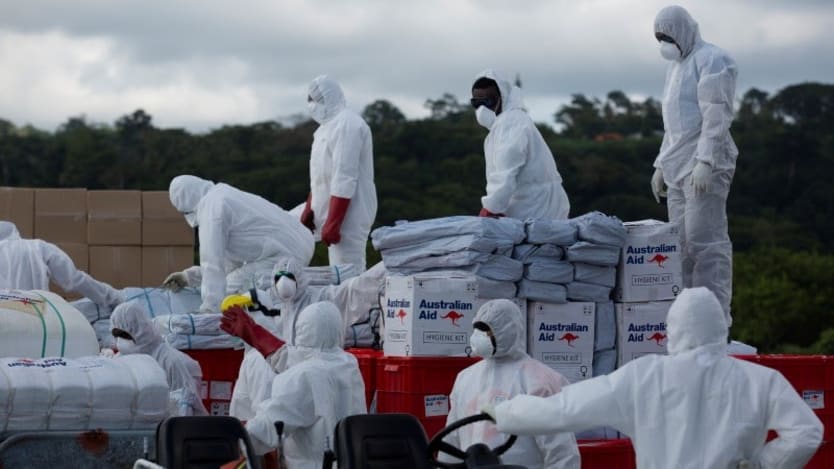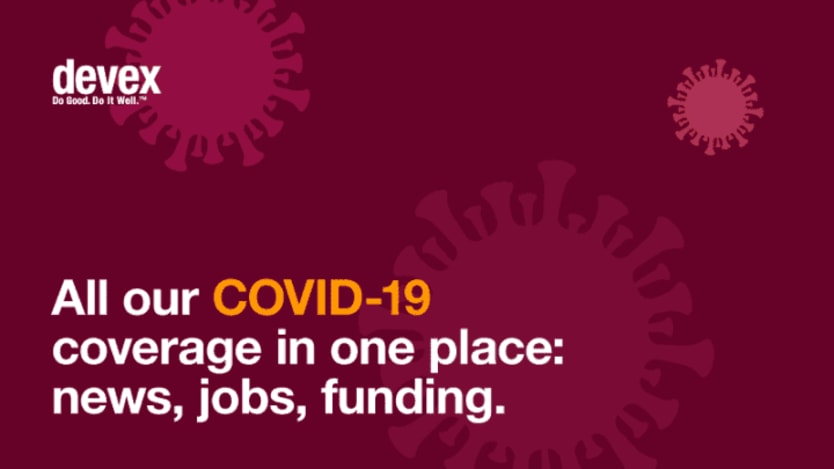Australian NGOs start campaigning for international COVID-19 support

CANBERRA — The challenges of supporting low- and middle-income countries in preparing and responding to COVID-19 is at the forefront of thinking for NGOs globally — including in Australia where support for the Pacific region is part of core business.
"COVID-19 and its economic and social repercussions are going to hit the world's poorest people the hardest,” CARE Australia told Devex, the organization gave a blanket statement as it was tied up with Cyclone Harold.
CARE, along with other Australian-based NGOs, is conducting campaigns to raise funds and awareness to support COVID-19 programs outside Australia. Among these NGOs, the focus on the particular challenges in the Pacific region is a critical reason for the need to campaign.
Indigenous Australian aid supplier pivots to domestic work
The company i2i Global is shifting focus from its international aid contracts to domestic initiatives supporting Indigenous Australians amid the COVID-19 pandemic. But this may result in DFAT losing experienced Indigenous development professionals in the years ahead.
“The remoteness and isolation of these island nations that should be their salvation may quickly become their damnation,” Mat Tinkler, deputy CEO for Save the Children, said. “The health systems in most Pacific nations are grossly under-resourced and will struggle to cope with an outbreak of COVID-19. The effects of a widespread outbreak on vulnerable communities in the Pacific, and especially children, could be cataclysmic.”
“CARE is focussed on communicating these messages to our supporters and the broader public, while also acknowledging that they are going through a very difficult and unusual time themselves,” CARE Australia said.
The financial challenges the sector faces also makes campaigns important, with concerns raised that many NGOs will be forced to close their doors permanently — despite Australia receiving access to a government financial assistance program that will enable NGOs to maintain staff if their turnover has declined 15% or more.
“The Australian aid agencies on the front line of containing COVID-19 in the Pacific and developing nations are being hard-hit by the economic downturn and may struggle to survive the coming months,” Susan Legana, CEO of Plan International Australia, told Devex.
“Firstly, because we receive government grants to deliver the work that do not necessarily extend to staff wages and secondly, as donations dry up, we are suffering a slower, rather than an immediate downturn, but even so the effects will be just as disastrous.”
Preparing for the Pacific challenge
Current numbers of COVID-19 cases in the Pacific region are low in comparison to the hotspots of Europe and North America. But there is an expectation that numbers will grow — and campaigning now to build financial and political support among NGOs is important.
“The biggest impact on World Vision is the job of gearing up for the huge task ahead of us,” Mike Bruce, media manager for World Vision Australia, told Devex. “That is, building the resources we are going to need for one of the biggest humanitarian responses we have ever undertaken – a whole-of-organisation operation to support so many vulnerable communities and developing countries, to combat COVID-19.”
World Vision, Bruce said, is already working in many of these countries to combat the virus and build awareness, and pivoting existing programs to COVID-19 support where possible.
“Over the next few months World Vision will pull out all stops to reach 22.5 million people in 17 countries with its COVID-19 response plan. And that is just the starting point, with plans to go into all areas in which WVA is operating.”
In building their campaign, Bruce said the strategy is to build on the challenges high-income countries have faced and apply this in a low- or middle-income setting.
“Once the focus of COVID-19 starts to move away from the situation in Australia — and other developed nations such as the US and UK — the attention will inevitably begin to turn to developing nations of the world where the crisis is still in its early stages,” he said.
“We argue that COVID-19 has created a vulnerability in the lives of Australians in a way that has not been seen in more than a century. We hope that this opens people’s hearts to the massive challenges experienced in the world’s most vulnerable communities and galvanises Australians into supporting those people,” Bruce said.
The strategy for Plan International follows the same lines, hopeful that local issues do not impact willingness to give to global causes.
“It is too simplistic — and too soon — to predict that people won’t be willing to donate for international humanitarian causes, as we believe Australians’ own experience with the pandemic will heighten their empathy for other, more vulnerable communities around the world,” Legana said.
“We argue that COVID-19 has created a vulnerability in the lives of Australians in a way that has not been seen in more than a century. We hope that this opens people’s hearts to the massive challenges experienced in the world’s most vulnerable communities and galvanises Australians into supporting those people,” Legana said.
Is shared pain and hope enough for a marketing campaign?
Tim Middlemiss, a social impact communications consultant, has extensive experience in supporting Australian NGOs with their public campaigns. And he believes focusing on connections is important in building a marketing campaign.
“This moment isn't just affecting one neighbourhood, or one region, but the entire globe,” Middlemiss told Devex. “For an INGO, this is a unique moment to build empathy not just sympathy. Connect with donors in their personal moment, and extend the horizons of their experiences to the places in which you work.”
Another reframing opportunity Middlemiss sees for NGOs is in an area where he said they have been traditionally weak.
“That their constituents are overseas and unable to connect directly with donors, has now been flattened out,” he said. “When everyone is locked down, we're all equally as distant from each other. Or more positively, no matter where you are in the world, we can connect as closely as my next door neighbour.
“As donors become used to Zoom calls and House Party games, how might you use this opportunity to showcase your in-country staff and programs in a way that you thought donors weren't previously ready,” he said.
But the key, Middlemiss said, is to be patient in understanding that the pandemic will create wide-reaching impacts for months or years to come. He also thinks it is necessary to be brave in engaging with the community.
“This is an environment to test and to learn, to build or continue good digital habits that will stand long after the pandemic is gone,” he said.
Visit our dedicated COVID-19 page for news, job opportunities, and funding insights.

Search for articles
Most Read
- 1
- 2
- 3
- 4
- 5








